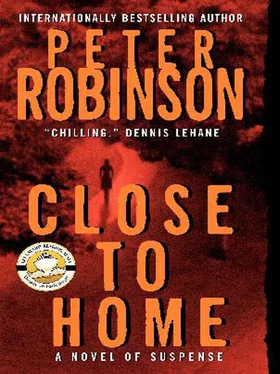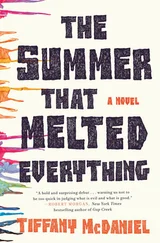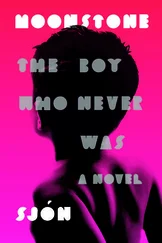Michelle found it difficult to decipher Shaw’s handwriting in the notebooks she did find, but she could just about make out that his last entry was on August 15, 1965, when he had been questioning a witness to a post office robbery, and the next one was a new notebook started on the sixth of October of the same year.
Michelle asked for Mrs. Metcalfe’s help, but after half an hour even the poor records clerk had to admit defeat. “I can’t imagine where they’ve got to, love,” she said. “Except they might have got misfiled by my predecessor, or lost in one of the moves.”
“Could someone have taken them?” Michelle asked.
“I don’t see who. Or why. I mean, it’s only people like you who come down here. Other police.”
Exactly what Michelle had been thinking. She could have taken out anything she wanted during her visits, and Mrs. Metcalfe would have been none the wiser. Which meant that anyone else could, too. Someone had gained entry to her flat and tried to scare her off the case, and now she found that nearly two months’ worth, a crucial two months’ worth, of notebooks had somehow disappeared. Coincidence? Michelle didn’t think so.
Half an hour later, when they had run into the same problem with the action allocation book for the Graham Marshall case, Michelle knew in her bones that the actions and the notebooks were gone forever, destroyed, most likely. But why? And by whom? The discovery didn’t help her paranoia one bit. She was beginning to feel way out of her depth. What the hell should she do now?
After the interview, Banks felt the urge to get out of the station, away from the acrid stink of Norman Wells’s sweat, so he decided to head out Lyndgarth way and talk to Luke Armitage’s music teacher, Alastair Ford, while Annie continued to supervise the search for Luke’s mystery woman.
In Banks’s experience, music teachers were an odd lot indeed, partly, no doubt, because of the frustration of trying to instill the beauties of Beethoven and Bach into minds addled with Radiohead and Mercury Rev. Not that Banks had anything against pop music. In his day, the class had kept pestering their music teacher, Mr. Watson, to play The Beatles. He relented once, but looked glum the whole time. His feet didn’t tap, and his heart wasn’t in it. When he played Dvorak’s New World Symphony or Tchaikovsky’s Simphonie Pathétique, however, it was another matter. He closed his eyes, swayed and conducted, hummed along as the main themes swelled. All the time the kids in the class were laughing at him and reading comics under their desks, but he was oblivious, in a world of his own. One day Mr. Watson failed to turn up for class. Rumor had it that he’d suffered a nervous breakdown and was “resting” in a sanatorium. He never returned to teaching as far as Banks knew.
Yesterday’s rain had rinsed the landscape clean and brought out the bright greens of the lower daleside, dotted with purple clover, yellow buttercups and celandines. The limestone scar of Fremlington Edge glowed in the sunlight, and below it the village of Lyndgarth, with its small church and lopsided village green, like a handkerchief flapping in the wind, seemed asleep. Banks consulted his map, found the minor road he was looking for and turned right.
Ford’s cottage was about as isolated as Banks’s own, and when he parked behind the dark blue Honda, he understood why. It wasn’t the New World Symphony but the beautiful Recordare for soprano and mezzo-soprano from Verdi’s Requiem blasting out of the open windows at full volume. If Banks hadn’t been playing the Stones’s Aftermath CD in the car, he would have heard it a mile away.
It took a bit of hammering at the door, but eventually the music quietened down and it was answered by the man Banks recognized from the Aeolian String Quartet concert. Alastair Ford had five o’clock shadow, a long, hooked nose and a bright gleam in his eyes. If he had any, his hair would probably have been sticking out in all directions, but he was quite bald. What was it about Luke Armitage? Banks wondered. This was the second person he’d met that day who had spent time with the boy and looked as mad as a hatter. Maybe Luke attracted weirdos. Maybe it was because he was more than a little weird himself. However, Banks determined to keep an open mind. Whether Alastair Ford’s eccentricity had a dangerous edge remained to be seen.
“I’m as fond of Verdi as the next man,” said Banks, showing his warrant card, “but don’t you think it’s a bit too loud?”
“Oh, don’t tell me old farmer Jones has complained about the music again. He says it curdles his cows’ milk. Philistine!”
“I’m not here about the noise, Mr. Ford. Might I come in and have a word?”
“Now I’m curious,” said Ford, leading the way inside. His house was clean but looked lived-in, with little piles of sheet music here and there, a violin resting on a low table, and the massive stereo system dominating the living room. “A policeman who knows his Verdi.”
“I’m no expert,” Banks said, “but I’ve recently bought a new recording, so I’ve listened to it a few times lately.”
“Ah, yes. Renée Fleming and the Kirov. Very nice, but I must admit I’m still rather attached to the von Otter and Gardiner. Anyway, I can’t imagine you’ve come here to discuss old Joe Green with me. What can I do for you?” Ford was birdlike in many ways, especially in his sudden, jerky movements, but when he sat down in the overstuffed armchair he fell still, fingers linked in his lap. He wasn’t relaxed, though. Banks could sense the man’s tension and unease, and he wondered what its cause was. Maybe he just didn’t like being questioned by the police.
“It’s about Luke Armitage,” said Banks. “I understand you knew him?”
“Ah, poor Luke. A remarkably talented boy. Such a great loss.”
“When did you last see him?”
“Around the end of term.”
“Are you sure you haven’t seen him since?”
“I’ve barely left the cottage since then, except to drive into Lyndgarth for groceries. Alone with my music after a term of teaching those philistines. What bliss!”
“I gather Luke Armitage wasn’t a philistine, though?”
“Far from it.”
“You were giving him violin lessons, am I right?”
“Yes.”
“Here or at school?”
“At school. Tuesday evenings. We have a reasonably well-equipped music room there. Mind you, we ought to be grateful for anything these days. They’ll spend a fortune on sports equipment, but when it comes to music…”
“Did Luke ever talk to you about anything that was on his mind?”
“He didn’t talk a lot. Mostly he concentrated on his playing. He had remarkable powers of concentration, unlike so many of today’s youth. He wasn’t much of a one for small talk. We did chat about music, argued once or twice about pop music, which I gathered he was rather fond of.”
“Never about anything else?”
“Like what?”
“Anything that might have been bothering him, worrying him, anyone he might have been afraid of. That sort of thing.”
“I’m afraid not. Luke was a very private person, and I’m not the prying kind. Truth be told, I’m not very good at helping people with their emotional problems.” He ran his hand over his smooth head and smiled. “That’s why I prefer to live alone.”
“Not married?”
“Was. Many moons ago.”
“What happened?”
“Search me. What usually happens?”
Banks thought of Sandra. What usually happens? “So you just taught him the violin, that’s all?”
“Mainly, yes. I mean, he was in my class, too, at school. But I wouldn’t say I knew him or that we were friends or anything like that. I respected his talent, even if he did dabble in pop music, but that’s as far as it went.”
Читать дальше












